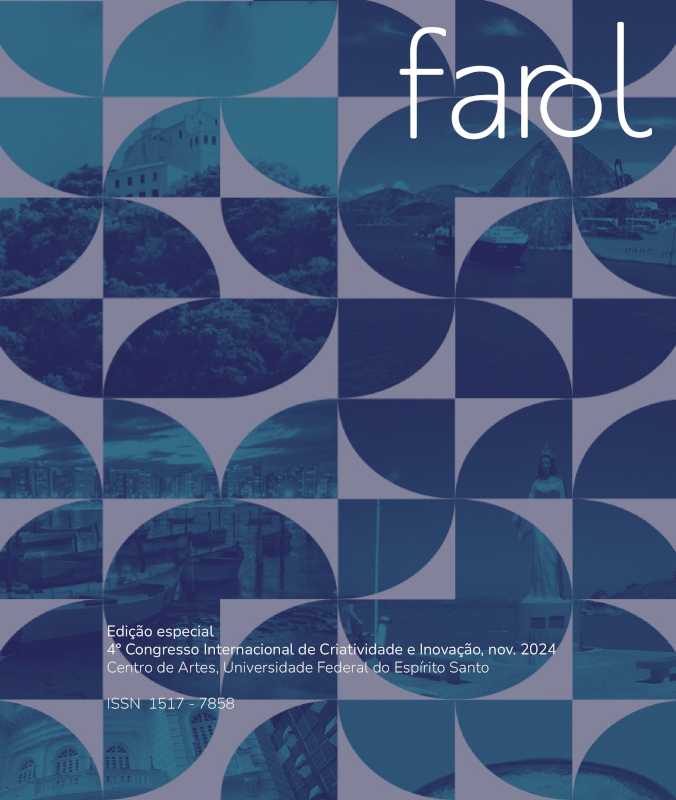Mise à jour
l'idéologie de la créativité
Mots-clés :
psicologia do desenvolvimento, ideologia da criatividade, teoria dos sistemasRésumé
Il y a dix ans, j'ai écrit Worldmaking: Psychology and the Ideology of Creativity, retraçant les fonctions idéologiques du concept de créativité au fil du temps. Le monde et la psychologie de la créativité ont changé. Du point de vue du développement, de la socioculturel et des systèmes complexes, comment pouvons-nous comprendre et répondre aux troubles qui émergent dans les paysages politiques, environnementaux et technologiques, ainsi qu’à la fragmentation sociale déstabilisatrice et à l’intensification des conflits géopolitiques ?
Références
BATESON, G. Conscious purpose versus nature. In: Steps to an ecology of mind, (pp.). Chicago, IL, US: University of Chicago Press. 1972a. p. 432-445.
BATESON, G. Ecology and flexibility in urban civilization. In: Steps to an ecology of mind. Chicago, IL, US: University of Chicago Press. 1972b. p. 502-513.
BATESON, G., & BATESON, M. C. Angels fear: Towards an epistemology of the sacred. Cresskill, NJ, US: Hampton Press, Inc. 2005.
BOURDIEU, P. The rules of art: Genesis and structure of the literary field. EMANUEL, S. (Trans.). Stanford, CA, US: Stanford University Press. 1995.
CLAPP, E. P. Participatory creativity: Introducing access and equity to the creative classroom. New York, NY, US: Routledge. 2017.
CRAFT, A. Creativity in schools: Tensions and dilemmas. New York, NY, US: Routledge. 2005.
CRAFT, A., GARDNER, H., & CLAXTON, G. (Eds). Creativity, wisdom and trusteeship: Exploring the role of education. Thousand Oaks, CA, US: Corwin Press. 2007.
CSIKSZENTMIHALYI, M. Creativity: Flow and the psychology of discovery and innovation. New York, NY, US: HarperPerennial. 1997.
CSIKSZENTMIHALYI, M. Implications of a systems perspective for the study of creativity. In STERNBERG, R. J (Ed.). Handbook of creativity. Cambridge, UK: Cambridge University Press. 1999. p. 313–35.
FOUCAULT, M. What is an author? In: J. D. FAUBION, J. D. (Ed.), RABINOW, P. (Ser. Ed.). Essential works of Foucault 1954–1984, Volume 2. Aesthetics, method and epistemology New York, NY, US: The New Press. 1998. p. 204–22. (Original lecture in French 1969)
FREEDEN, M. Ideology: A very short introduction. Oxford, UK: Oxford University Press. 2003.
GRISANTI, M. L. Interview with Howard E. Gruber. International Journal of Group Tensions, New York, NY, US, v. 27, n. 4, p. 219–43, 1997.
GRUBER, H. E. Darwin on man: A psychological study of scientific creativity (2nd ed.). Chicago, IL, US: University of Chicago Press. 1981.
GRUBER, H. E. The evolving systems approach to creative work. In: WALLCE, D. B; GRUBER, H. E. (Eds). Creative people at work. Oxford, UK: Oxford University Press. 1989. p. 3–22.
GRUBER, H. E.; WALLACE, D. B. The case study method and evolving systems approach for understanding unique creative people at work. In: STERNBERG, R. J. (Ed.). Handbook of creativity. Cambridge, UK: Cambridge University Press. 1999. p. 93–115.
GUILFORD, J. P. Creativity. American Psychologist, Washington, DC, US, v. 5, p. 444–54, 1950.
HANCHETT HANSON, M. Worldmaking: Psychology and the ideology of creativity. New York, NY, US: Palgrave Macmillan. 2015.
HANCHETT HANSON, M. Tragedies of actualization. In: GLĂVEANU, V. P. (Ed.), The creativity reader. Oxford UK: Oxford University Press. 2019. p. 191-218.
HANCHETT HANSON, M. with EISMAN, J.; JORGE-ARTIGAU, A.; PIEDE, S.; WASENITZ, S. Creative work and distributions of power. New York, NY, US: Routledge. In press.
MANNHEIM, K. Ideology and utopia. WIRTH, L. & SHILS, E. (Trans.). New York, NY, US: Harcourt, Brace & Company. 1954. (Original work published in German 1929)
MASLOW, A. H. Motivation and personality. New York, NY, US: Harper & Row Publishers, Inc. 1970. (Original work published 1954)
MASLOW, A. H. The journals of Abraham Maslow (Abr. ed.). LOWRY, R. J. & FREEDMAN, J. (Eds). Chicago, IL, US: The Lewis Publishing Company. 1982.
MASLOW, A. H. The farther reaches of human nature. New York, NY: Penguin Books. 1993. (Original work published 1971)
MASON, J. H. The value of creativity: The origins and emergence of a modern belief. Farnham, UK: Ashgate Publishing Company. 2003.
POPE, R. Creativity: Theory, history, practice. New York, NY, US: Routledge. 2005.
RAUNIG, G.; RAY, G.; WUGGENIG, U. (Eds.). Critique of creativity: Precarity, subjectivity and resistance in the ‘creative industries’. Exeter, UK: Mayflybooks.
REHN, A. ; DE COCK, C. (2009). Deconstructing creativity. In: RICKARDS, T.; RUNCO, M. A.; MOGER, S. (Eds). The Routledge companion to creativity. New York, NY, US: Routledge. p. 222–31.
ROGERS, C. R. Client-centered therapy. New York, NY, US: Houghton Mifflin Company. 1951.
ROGERS, C. R. On becoming a person: A therapist’s view of psychotherapy. New York, NY, US: Houghton Mifflin Company. 1989. (Original work published 1961)
RUNCO, M. A.; ALBERT, R. S. Creativity research: A historical view. In:KAUFMAN, J. C.; STERNBERG, R. J. (Eds). The Cambridge handbook of creativity. Cambridge, UK: Cambridge University Press. 2010. p. 3–19.
SHELLEY, M. W. Frankenstein: The 1818 text. London, UK: Penguin Classics. 2018.
STERNBERG, R. J. Transformational creativity: The link between creativity, wisdom, and the solution of global problems. Philosophies, v. 6, n. 3, 75. 2021. https://doi.10.3390/philosophies6030075
VON GOETHE, J. W. Faust: Parts I and II. KLINE, A. S. (Trans.). Scotts Valley, CA, US: CreateSpace Independent Publishing Platform. 2015. (Original published in German in 1808)
WEINER, R. P. Creativity and beyond: Cultures, values and change. Albany: State University of New York. 2000.
WEISBERG, R. W. Creativity: Understanding innovation in problem solving, science, invention and the arts. Hoboken, NJ, US: John Wiley & Sons. 2006.
ŽIŽEK, S. The sublime object of ideology (The essential Žižek) (2nd edn.). London, UK: Verso. 2009. (Original published 1989).
Téléchargements
Publiée
Numéro
Rubrique
Licence
(c) Copyright Michael Hanchett Hanson 2024

Ce travail est disponible sous licence Creative Commons Attribution - Pas d’Utilisation Commerciale - Partage dans les Mêmes Conditions 4.0 International.
Les auteurs des œuvres soumises à Revista Farol autorisent leur publication sur des supports physiques et électroniques, uniquement à des fins académiques, et peuvent être reproduites à condition de citer la source. Ils attestent de leur originalité, de leur paternité et de leur originalité.





